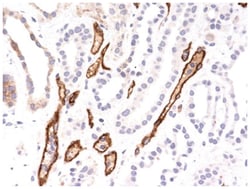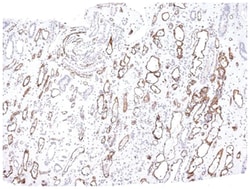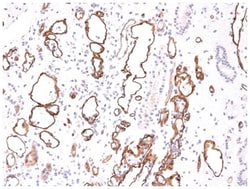Promotional price valid on web orders only. Your contract pricing may differ. Interested in signing up for a dedicated account number?
Learn More
Learn More
Complement C4d Antibody (C4D204), Novus Biologicals™


Mouse Monoclonal Antibody
Supplier: Novus Biologicals NBP2342340.2MG
Description
Complement C4d Monoclonal antibody specifically detects Antigen in Human samples. It is validated for Immunocytochemistry/Immunofluorescence, Immunohistochemistry (Frozen), Immunohistochemistry (Paraffin).Specifications
| Complement C4d | |
| Monoclonal | |
| Unconjugated | |
| PBS with 0.05% BSA. with 0.05% Sodium Azide | |
| C4A | |
| Recombinant human Complement 4d protein | |
| Protein A purified | |
| RUO | |
| 720 | |
| Human | |
| Purified |
| Immunocytochemistry, Immunofluorescence, Immunohistochemistry (Paraffin), Immunohistochemistry (Frozen) | |
| C4D204 | |
| Immunocytochemistry/Immunofluorescence 1:50-1:100, Immunohistochemistry-Paraffin 1:200-1:400, Immunohistochemistry-Frozen 1:200-1:400 | |
| P0C0L4 | |
| Mouse | |
| 192 kDa | |
| 0.2 mg | |
| Primary | |
| This MAb is specific to Complement 4d (C4d) and it reacts with the secreted as well as cell-bound C4d.C4d is a degradation product of the activated complement factor C4b. Complement 4b is typically activated by binding of Abs to specific target molecules. Following activation and degradation of the C4 molecule, thio-ester groups are exposed, which allow transient, covalent binding of the degradation product Complement 4d to endothelial cell surfaces and extracellular matrix components of vascular basement membranes near the sites of C4 activation. The presence of C4d in peritubular capillaries is a key indicator for acute humoral (i.e. antibody-mediated) rejection of kidney, heart, pancreas and lung allografts. As an established marker of antibody-mediated acute renal allograft rejection and its proclivity for endothelium, this component can be detected in peritubular capillaries in chronic renal allograft rejection as well as hyperacute rejection, acute vascular rejection, acute cellular rejection, and borderline rejection. It has been shown to be a significant predictor of transplant kidney graft survival. Anti-C4d, combined with anti-C3d, can be utilized as a tool for diagnosis of allograft rejection that may warrant a prompt and aggressive anti-rejection treatment. | |
| Store at 4C. | |
| IgG1 κ |
Product Content Correction
Your input is important to us. Please complete this form to provide feedback related to the content on this product.
Product Title
Spot an opportunity for improvement?Share a Content Correction


